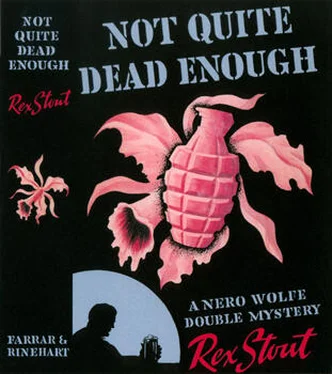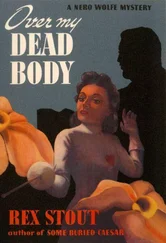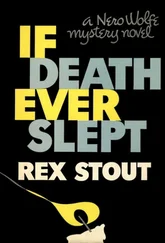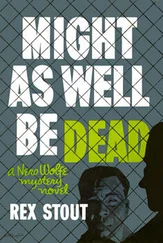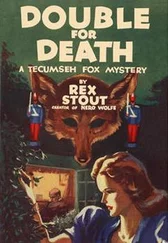Rex Stout
Not Quite Dead Enough
We swooped down and hit the concrete alongside the Potomac at 1:20 p.m. on a raw Monday in early March.
I didn’t know whether I would be staying in Washington or hopping a plane for Detroit or Africa, so I checked my bags at the parcel room at the airport and went out front and flagged a taxi. For twenty minutes I sat back and watched the driver fight his way through two million government employees, in uniforms and in civies, on wheels and on foot, and for another twenty minutes, after entering a building, I showed credentials and waited and let myself be led through corridors, and finally was ushered into a big room with a big desk.
It was the first time I had ever seen the top mackaroo of United States Army Intelligence. He was in uniform and had two chins and a pair of eyes that wasted neither time nor space. I was perfectly willing to shake hands, but he just said to sit down, glanced at a paper on top of a pile and told me in a dry brittle voice that my name was Archie Goodwin.
I nodded noncommittally. For all I knew, it was a military secret.
He inquired acidly, “What the hell is the matter with Nero Wolfe?”
“Search me, sir. Why, is he sick?”
“You worked for him for ten years. As his chief assistant in the detective business. Didn’t you?”
“All of that. Yes, sir. But I never found out what was the matter with him. However, if you want some good guesses—”
“You seem to have done pretty well with that mess down in Georgia, Major Goodwin.”
“Much obliged, sir. Speaking of Nero Wolfe—”
“I am about to.” He shoved the papers aside. “That’s why I sent for you. Is he crazy?”
“That’s one theory.” I looked judicious and crossed my legs, remembered who I was now, and uncrossed them. “He’s a great man, I grant that, but you know what it was that made the Australian wild dog so wild. Assistant is not the word for it. I was a combination accelerator and brake. I may mention that my pay was roughly three times what it is at the moment. Of course if I were made a colonel—”
“How long have you been a major?”
“Three days.”
He pronounced a certain word, just one word, very snappy.
“Yes, sir,” I said.
He nodded curtly, to signify that that was settled for good, and went on. “We need Nero Wolfe. Not necessarily in uniform, but we need him. I don’t know whether he deserves his reputation—”
“He does,” I declared. “I hate to admit it, but he does.”
“Very well. That seems to be the prevailing opinion. And we need him, and we’ve tried to get him. He has been seen by Captain Cross and by Colonel Ryder, and he refused to call on General Fife. I have a report here—”
“They handled him wrong.” I grinned. “He wouldn’t call on the King of China even if there was one. I doubt if he’s been outdoors since I left, two months ago. The only thing he has got is brains, and the only way to go is to take things to him: facts, problems, people—”
The mackaroo was shaking his head impatiently. “We tried to. Colonel Ryder went to try to get him to work on a certain matter of great importance, and he flatly refused. He’s no fascist or appeaser, according to his record. What’s wrong with him?”
“Nothing sir. Nothing like that. He’s probably in a bad mood. His moods never are anything to brag about, and of course he’s dejected because I’m not there. But the main thing is they don’t know how to handle him.”
“Do you know how to handle him?”
“Yes, sir.”
“Then go and do it. We want him on a day basis under Schedule 34H. We want him immediately and urgently on a matter that Colonel Ryder went to him about. Nobody has even been able to make a start on it. How long will it take you?”
“I couldn’t say. It all depends.” I stood up with my heels together. “An hour, a day, a week, two weeks. I’ll have to live in his house with him as I always did. The best time to work on him is late at night.”
“Very well. On your arrival, report to Colonel Ryder at Governor’s Island by telephone, report progress to him, and tell him when you are ready for him to see Mr. Wolfe.” He got up and offered me a hand, and I took it. “And don’t waste any time.”
In another room downstairs I found they had got me a priority for a seat on the three o’clock plane for New York, and a taxi got me to the airport just in time to weigh my luggage through and make a run for it.
All the seats were taken but one, the outside of a double near the front, and I nodded down at the occupant of the seat next to the window, a man with spectacles and a tired face, stuffed my hat and coat on the shelf, and lowered myself. In another minute we were taxiing down the runway, turning, vibrating, rolling, picking it up, and in the air. Just as I unfastened my seat belt, dainty female fingers gripped the seat arm, a female figure stopped, and the profile of a female head with fine blond hair was there in front of me, speaking across to the man with spectacles:
“Would you mind changing seats with me? Please?”
Not wanting to make a scene, there was nothing for me to do but scramble out of the way to permit the transfer. The man got out, the female got in and settled herself, and I sat down again just as the plane tilted for a bank.
She patted my arm and said, “Escamillo darling. Don’t kiss me here. Good heavens, you’re handsome in uniform.”
“I haven’t,” I said coolly, “any intention of kissing you anywhere.”
Her blue eyes were not quite wide open and a corner of her mouth was turned up a little. Viewed objectively, there was nothing at all wrong with the scenery, but I was in no frame of mind to view Lily Rowan objectively. I have told elsewhere how I met her just outside the fence of an upstate pasture. The episode started with me in the pasture along with a bull, and the situation was such that when I reached the fence considerations of form and dignity were minor matters. Anyhow, I got over, rolled maybe ten yards and scrambled to my feet, and a girl in a yellow shirt and slacks clapped her hands sarcastically and drawled at me. “Beautiful, Escamillo! Do it again!”
That was Lily. One thing had led to another. Several others. Until finally …
But now—
She squeezed my arm and said, “Escamillo darling.”
I gazed straight at her and said, “Lookit. The only reason I don’t get up and ask one of our fellow passengers to change seats with me is that I am in uniform and the service has notions about dignity in public places, and I know quite well that you are capable of acting like a lunatic. I am going to read the paper.”
I unfolded the Times. She was laughing in her throat, which I had once thought was an attractive sound, and she arranged herself in her seat so that her arm was against mine.
“Sometimes,” she said, “I wish that bull had got you that day three years ago. I never dreamed, when I saw you tumbling over that fence, that it would ever come to this. You haven’t answered my letters or telegrams. So I came to Washington to find out where you were, intending to go there — and here I am. Me, Lily Rowan! Escamillo, look at me!”
“I’m reading the paper.”
“Good heavens, you’re wonderful in uniform. Very rugged. Doesn’t it impress you that I found out you were taking this plane and got on before you did? Am I a smart girl or not?”
I didn’t say anything.
“Answer me,” she said with an edge to her voice.
She was capable of anything. “Yeah,” I said, “you’re smart.”
“Thank you. I’m also smart enough to know that your being mad at me because I said that Ireland shouldn’t give up any naval or air bases is phony. My father came here from Ireland and made eight million dollars building sewers — and I’m Irish and you know it, so your going sour on me on account of that is the bunk. I think you think you’re tired of me. I have palled on you. Well?”
Читать дальше
